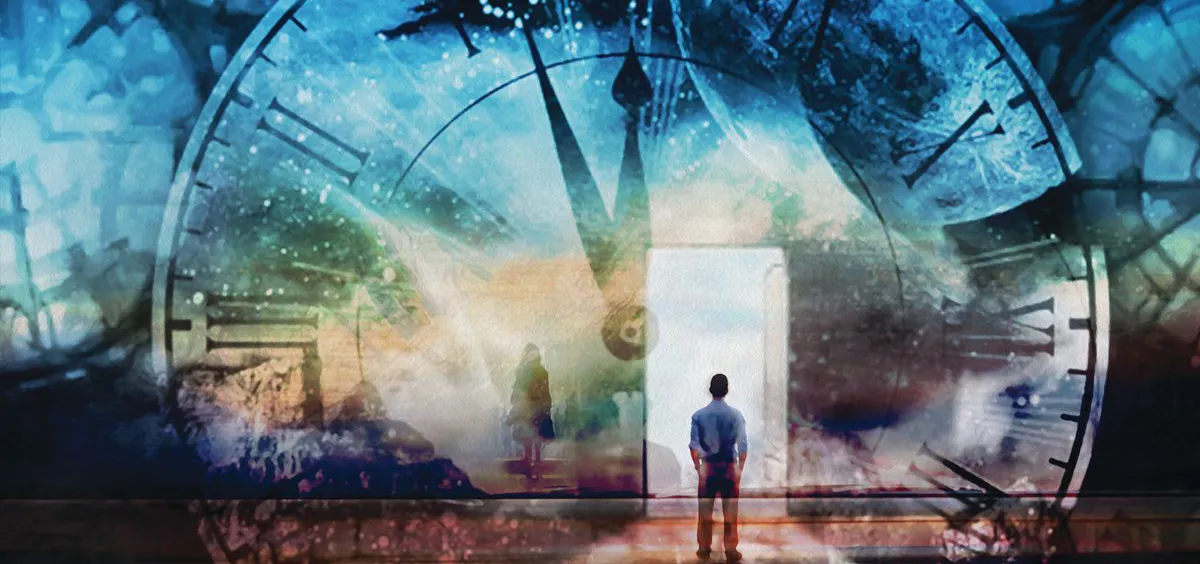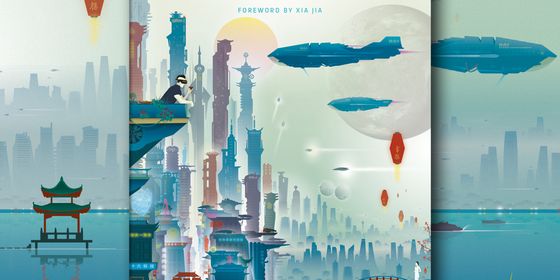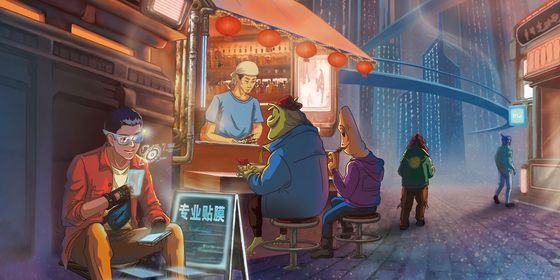In this short sci-fi tale, two friends take different paths to the future—but only one will make peace with the present
Author: Li Angao 黎安高
Li Angao is an amateur writer who works full-time at a bank. As a teenager, he became a passionate reader of Chinese martial arts, whodunnit, epic-fantasy, and techno-thriller novels. In June 2017, he published his first story “The Welwitschia Plan” in Science Fiction World magazine. He earned his BA in Finance from Central South University in China, and has a MSc in Sociology from the University of Edinburgh
1.1
“Hey! It’s moving; it’s moving!” Oliver prodded Roland with his elbow.
Roland, stood up, only half-awake. They’d been napping in turns, resting their heads on each other’s shoulders. It was October in Beijing, and the scent of autumn was strong in the air. Roland took a deep breath; the chilly atmosphere struggled in vain against the weariness of his body, and was finally defeated with a drawn-out yawn.
Oliver took out his phone. It was 7 in the morning, and the first rays of the sun were breaking through the curtain of darkness. He turned his stiff neck and remarked: “The early bird gets the worm. The lines are even crazier than the real estate lottery 20 years ago.”
Roland grunted absentmindedly in agreement. He pushed up the bridge of his glasses and stood on his tiptoes, looking over the sea of heads moving about the long line extending to the entrance of the Glittering Era VIP Hall. The line was wound around the movable barriers within the plaza. Then, like a snake slowly uncoiling after a winter’s hibernation, the crowd suddenly started to move, dragging itself into the postmodernist structure.
Oliver and Roland followed. In about five minutes—plus one night camped outside the entrance—the two entered the VIP Hall. The interior was vast and bright, the crowd gradually spread out. Just as Roland was wondering which way to turn, an usher guided the two of them to their seats.
The space had been temporarily filled with school desks. Already, the ten rows closest to the stage were full. Oliver and Roland sat side by side; although the desks’ writing surfaces weren’t very comfortable, at least there was plenty of space, allowing them to stretch their stiff muscles and bones.
The emcee came on stage, speaking with passion in a booming voice: “Respected guests, thank you all very much for attending the fourth lottery for tickets to the Glittering Age! Drawing will commence at eight minutes after 8 o’clock! According to the Notice Upon Further Stabilization of the Long-Term Temporal Emigration Market issued by the State Ministry of Temporal Resources Management, with respect to customers’ demand, private placement has been made at a fixed price for temporal emigration terms in the order of 15, 20, 25, 30, and 60 years.
“For the current temporal migration plan, no matter the term, all winners will enjoy the privilege of taking along their spouse and family, for a total of up to eight people for the entire duration of the zero vital-sign cryostasis.” The emcee paused meaningfully. “That is to say, these current regulations are extremely suitable for taking your entire family along as temporal emigrants. In this drawing, of the 1,500 of you seated here, there will be 100 VIPs who have a date with the Glittering Age! Run toward the future! Run towards your own Glittering Age!”
One corner of the hall spontaneously burst into applause, and, in the following few seconds the clapping spread across the room. The lights shone in the guests’ eyes, as if their own enthusiasm was about to spill out of their bodies. Some of the guests had already sat down, but stood up again to clap. “I sincerely hope that you will be among those hundred winners!” The emcee waved his arms, putting on a performance.
Oliver clapped along with everyone else; turning his head, he caught a glimpse of Roland cupping his chin, unmoved by the speech. Oliver pounded on his desk, shouting: “Bro, we are definitely gonna win!”
Roland’s heart skipped a beat. He knew that Oliver thought that he wasn’t joining in because he was unhappy with the 15-to-1 odds. In fact, the thought of being frozen for 25 years and waking up in an unfamiliar world didn’t seem such a wonderful prospect to him as it did to Oliver.
Besides, everybody knew that temporal emigration was a huge bubble. Prices were already ridiculous, and climbed every year, continually breaking records. Still, willingly or not, tons of the rich and middle classes were rushing into it. Roland sighed a little. He was rational, but he couldn’t fight off his wife’s constant refrain of “let’s head toward a better future,” so he’d waited in front of the VIP Hall since ten o’clock the previous evening.
3.1
The automatic door, wide enough for two, slid upward. The man quickened his steps as he walked into the office building. Sensing that nobody else was coming in, the entrance slid down with a whoosh, sealing the frame tightly against the sandstorm outside.
The man took off his airtight purifier helmet, and balled up his sand-covered cloak, stuffing it into his lobby cubby-hole.
“Mr. Li, good morning!” Little Xing, the robot receptionist, greeted him at the front desk, as it did every morning. Little Xing was built in the form of the company’s mascot—a doll in the “chibi” style of the previous century, with a spherical head and huge eyes, like an anime character.
A century goes by quickly, and technology progresses, but that hasn’t cured the temporal industry of the bumptious tastes of real-estate firms.
The man raised his eyebrows, not stopping as he walked toward the elevator. “Morning, Xing.”
“After meeting today’s client, will you be formally retiring?” As the man walked over to the reception desk, Little Xing extended its arms towards him, a small box in its hands. It had the logo of Fuxing Temporal, and beneath it, the words “To Comrade Li Huan.”
The man paused for a second, mulling that, although Little Xing had been in service for three years, aside from a “good morning” each day, this was the first conversation they’d had.
“Thank you for your 29 years of service to the company!” Little Xing placed the box into Li’s hands. “This is a small gift from us to you.”
“Thanks,” Li nodded, put on a smile, and walked over to the mag-lift.
Once inside, Li pushed the opening mechanism on the gift box, projecting a small hologram of Fuxing Temporal’s president Yang Shengjie that grew from the size of a finger to about a hand. “Yesterday Once More” by The Carpenters began to play: “When I was young, I listen…”
The six or seven other people in the mag-lift looked at him oddly. Li hastily closed the box, whispering, “Sorry.”
Exiting the elevator, he nodded politely at the endless stream of his co-workers’ faces. He passed through the crowded open-plan office, then the miniscule private offices of the middle managers. He stopped in front of his own office; the pupil-scanner quickly verified him as the occupant of the 40-square-meter space behind the door.
Li Huan walked into his office, and the door silently returned to its original position, merging into the wall. The gray room suddenly oozed with light: The ceiling turned bright blue within the time of a breath; the optical projector painted white clouds upon it, gathering and scattering, like swirling milk. The floor turned into a verdant patch of grass, individual blades swaying gently wherever a foot was set, extending all the way to the walls, which were now distant forests, spaced out naturally.
Li sat in front of his desk, and started to inspect the box Little Xing had given him. “Yesterday Once More” began to play again, and the hand-sized President Yang seemed to be saying something, but Li wasn’t paying attention—it couldn’t be more than “thanks for all you’ve done for Fuxing Temporal,” “the ages of Fuxing will commemorate your contributions,” “no matter what kind of future you are in, you’ll always be an important part of the Fuxing family,” and other such pleasantries.
Instead, Li was absently gazing on the ball-cactus in a little pot on his desk. It was the only greenery in the room that was real, a gift brought by a German friend from his home country. Looking at it, Li couldn’t help but start reflecting on his 29 years of service at Fuxing Temporal.
He’d joined when he was 33, and had progressed step by step, from a cramped workstation in the outer room to his own office. He had become one of the leading consultants in the temporal industry because of his day-in, day-out hard work. He was 62 this year; and aside from 20 days during two round-trip vacations to the moon, he’d never been in cryostasis.
In this day and age, that kind of life was rare.
Ding-dong. The retro sound of the doorbell pulled Li’s thoughts back to reality. As he stood up, the door that only opened for those with appointments parted automatically. Outside stood a woman, full of beauty and grace, except for her wan face and dark circles around her eyes.
Li greeted her: “Miss Su, please have a seat. I’ve waited a long time to meet you.”
1.2
By 11 a.m., the Glittering Age lottery had been going on for three hours. The draw was done by computer and took place in groups, with five winners from each. These lucky few needed to pay a commitment fee and complete their pre-registration within 20 minutes. If they couldn’t pay, or didn’t have all the necessary information to fill the forms within the allotted time, the entrants forfeited their chance, and the next round would begin. Right now, the left half of the giant screen displayed five names from the ninth group, each name with a serial number from 41 to 45. None of them had dropped out yet.
As the emcee had previously explained, the fourth round of selections for the Glittering Age had temporal emigration terms of 15, 20, 25, 30 and 60 years. Each term had 20 spots. The right half of the screen showed the number of remaining spots for temporal emigrants in each category.
Oliver was tapping his fingers on his desk, drumming lightly with both hands. Roland looked at his friend, seeing the corners of his mouth moving, as if he was muttering something. He couldn’t help but smile when he heard what Oliver was chanting.
“Deng Xiaoyong, Deng Xiaoyong, Deng Xiaoyong Deng Xiaoyong…”
Deng Xiaoyong was Oliver’s legal name. He and Roland both worked at a large multinational corporation, where English was the language for internal communication, and employees had to adopt English names. Oliver and Roland, who were also personal friends, had gotten into the habit outside of work.
“Oliver,” Roland smiled. “You trying to use psychic powers to influence the draw?”
“It’s almost the last round for the morning,” Oliver retorted. “It’s psychic powers or nothing.”
“Aren’t there still 50 places left in the afternoon draw?”
“There are 50 places total for the afternoon,” said Oliver, as he pointed toward the main screen, “but only four left in the 30-year category.”
Roland studied the screen. Of the 40 people who had been selected, 16 had already taken the 30-year option. Eleven had chosen 25, five had chosen 20, and seven had chosen 15; only one person had gone with the 60-year option.
“It makes complete sense that 30 years would be the most popular option,” Roland remarked.
“Yeah. The air will be better, the ecosystem will be more balanced, cities will have upgraded. All these things are long-term processes; I can’t see them being accomplished any quicker than that. I mean, how cool is this? Go to sleep, skip the revolution, and wake up to a perfect new world.”
Roland smiled and gave no reply. It was a matter of course that Oliver had faith in the future. Roland had no desire to argue with him, so instead took the conversation in a different direction. “Wasn’t your pop pushing for the 60-year option? How’d you talk him round?”
“The generation before us crossed the millennium, so they’re really into the idea of crossing centuries. My mom and pop were always saying, with ZV cryostasis technology maturing, they wanted to cross centuries one more time. I spent months dissecting the situation from every angle, and we had a couple of big fights.” Oliver sighed, and continued. “In the end they gave in; maybe they think the changes after six decades will be too great. The future in 30 years will still have many traces of an age they are familiar with. After 60 years, that’s not such a sure thing. If you migrate too far, no matter how good that place is, you’ll never feel like it belongs to you, or that you belong to it.”
“No matter how far a distance you go,” Roland argued, “you can always find a road to home. If you travel 60 years forward, though, you’ll never be able to come back.” So what’s the fundamental difference, he wondered to himself, between 30 and 60 years?
“Actually, going forward 10 years could be really good, too. After you wake up, some things will have advanced, and if you’re satisfied, you can stay there, like a vacation. If you’re not satisfied, you can freeze yourself for another eight, ten years. It’s just too expensive to emigrate in short intervals. Some of us don’t have the economic means for so much hassle,” Oliver was sighing.
“If you’re talking about truly settling down, then the 25 and 30-year terms have the best cost-performance ratio. Speaking of which, was 30 years your idea or your girlfriend’s?” asked Roland.
“It was mine; Jiajia still hasn’t agreed to emigrate to the future.”
“Shit, and you still came to the drawing?” Roland reflected that he himself didn’t have the gall for this “do first, ask forgiveness later” approach. “You’re so sure that after you set it up, you’ll be able to convince her to emigrate to the future? And she’ll be fine with you choosing 30 years?”
“There’s so much great stuff in the future. Who wouldn’t want to go, given the chance?” Oliver pouted. “I figure she’s just afraid of the concept of being frozen for a few decades. Just like when airplanes first came out—a bunch of people were too afraid to fly, but later on they discovered it was quite safe, and people got over scaring themselves.”
Just as he finished speaking, Oliver stood up, and threw his hands in the air, his face registering triumph and disbelief, like a goalie who’d just nailed a last-minute save.
Roland looked up at the stage. The screen read: “46 – Deng Xiaoyong.”
3.2
Su Bu took a seat in front of Li Huan’s desk, and brushed her hair off her face. She saw Li was looking at her. That wasn’t at all strange; she was a very attractive woman, and her appearance always drew stares, like ants to honey. What was strange was that, when Li looked at her, his eyes were simply seeing, not feasting on her. Su cleared her throat, with purpose; whether 30 years back or 30 years in the future, no pretty woman wants an old man lustily gazing upon her. But what she disliked even more was an old man looking at her with eyes completely devoid of desire.
Li blushed as he smiled. “Miss Su, I loved watching your films when I was younger. I’m an old man, but when I see you looking the exact same as you did on the screen, I can’t help but feel like all these years I lived actually haven’t passed me by. It must seem funny to you.”
“I’m honored by your kindness.”
After these brief pleasantries, Li turned to the actual topic at hand. “My team has already completed the analysis report. We hope it will provide you with solid information to consult when making your decision about emigrating further.” A projection panel popped out of Li’s desk. Li extended his hand and made a few swipes in front of the projection, and the virtual forests on the wall facing Su turned into a report full of graphics and text. Li tapped a few more times on the projection panel, and graphics flowed around the screen to form a new report in front of his client.
“Thank you,” Su took control of the report display and browsed its contents quickly. As she looked it over, Li commented concisely on the content displayed at each stage. “Over the course of the decade, the aftershocks of the temporal bubble and financial crisis will gradually fade. The global economy will recover. Today, we can objectively state that the benefits of the development of temporal technology outweigh the costs to humanity. Rather than us acclimatizing to the future, it has allowed us to choose our futures…
“According to the assessments made by our company’s external experts in regard to extraterrestrial exploration, finding clean energy solutions using new extraterrestrial energy sources within the next 50 years is impracticable, based upon the high cost and difficulty of survey and transport…
“Assuming the major world economies’ continued compliance with the Treaty, in another 100 years, the Earth’s ecological equilibrium index can be restored to the value it had at the start of this century…
“In 2048, researchers at the University of Edinburgh discovered that the main cryostasis technology used by the global temporal industry could only maintain zero vital-sign stasis for about 42 years. After 42 years, depending on the individual’s metabolism, subjects age between 1.7 and 2.3 years for each decade passed in stasis. In 2049, China passed the Temporal Emigration Act, Article 11, paragraph 3 of which stipulates that planning documents for long-term cryostasis for a period of longer than 40 years are not permitted to use ‘zero vital sign stasis’ or related terms. Paragraph 4 states that for a cryostasis period of 40 or more years, planning documents must use ‘low volatile sign cryostasis’ in their descriptions, and clearly state that those in cryostasis will experience some natural aging.”
By the time he finished explaining, Su had swiped through the whole report. Then Li Huan asked the question: “With our current level of technology, under the conditions of LVS cryostasis, if you went under for a century, taking metabolic differences into account, you would age between eight and eleven years. Considering this, do you still want to emigrate 100 years into the future?”
3.3
Su Bu pursed her lips tightly, but when she spoke, she didn’t answer Li Huan’s question. “I heard that in 2049, the government required tempo firms to wake up all clients who had signed up to do cryo for longer than four decades.”
“That is correct. Due to the huge amounts of compensation offered and the crisis of confidence, we had a market panic, which led to the collapse of the temporal bubble, as well as an economic crisis. That was the darkest page in the history of the temporal industry.”
“What I want to say is that, those who got woken up were lucky.” Su spoke quietly. “They had time to adjust to the world falling apart. They didn’t have to wake up full of hope and extravagant wishes, only to discover that reality was a nightmare.”
Li didn’t know what to say.
Su continued: “Mr. Li, can you tell me something? You worked in the temporal industry all these years—how could you remain calm? How did you resist the temptation to emigrate?”
This question was unexpected; Li shook his head awkwardly. “Actually, although I never personally agreed with skipping so much time into the future, when the emigration craze first started, I was no match for my wife’s enthusiasm, and went with a friend to a bunch of lotteries.”
“And then?”
“In the end, my friend finally got his wish, and won a spot in the 30-year scheme. I wasn’t so lucky. However, through attending those VIP events, I discovered a promising industry, so I quit my old job and signed up to join the temporal guys. After that, I had my second, then third child. I was busy with work; I didn’t have time for temporal emigration. So, just like people of the previous generations, I let my life go on in step with the passage of time. Before I knew it, my kids were grown, and I was old.”
Li laughed at himself, and at that moment glanced at the picture on his desk of him with his wife and children. His smile became peaceful and content. “Speaking of that friend, he should be revived from cryostasis this year. I’m old enough to be his father now.”
Su laughed along, but when her smile faded, the exhaustion and worry were hard to conceal. “I’ve thought it over, and eight years is fine, or ten, whatever. As long as I can leave this era, I’m willing to do what it takes.”
Li sighed, and gave Su the pre-filled contract. He hesitated for a second, and then spoke: “Speaking not as a temporal emigration consultant, but a person with life experiences…I don’t actually recommend buying such a temporal emigration plan. If you think about it rationally, you might find that this age isn’t as bad as you think. It’s not worth paying 10 years of your life to escape.”
Su looked around at the verdant landscape projected in Li’s office, and thought about the all-encompassing sandstorm outside. She thought she’d had enough of a world of the virtual and the desolate.
She shook her head: “With all due respect, you have no idea what a letdown this is for someone who was in cryostasis for three decades.”
“Yes, but who can say that the world a century later will live up to expectations?”
“But if I do nothing, then nothing will change.” Su no longer looked at Li, but lowered her head to sign the contract: “Su Bu, May 20, 2068.”
2.0
Li Huan sat in the corner of a café next to a window. He selected a latte and a half-portion of onion rings on a tablet, and swiped over to the payment step. He took off his glasses and covered his right eye with his hand, gazing into the device’s camera with his left. It quickly read his pupil. “Payment complete,” read the message on the screen.
As Li waited for his coffee and onion rings, he looked absentmindedly out the window. He didn’t notice when the waiter brought him his food and drink. Beijing in April was warm and pleasant, all billowing clouds and blue skies, and catkins floating in the air. The window reflected the young man who was playing the piano in the café; as his fingers floated across the keyboard and built up the chords, the image blurred before Li’s eyes, as if it were a trick of the light.
The pianist was playing something classical; Li couldn’t tell if it was Mozart or Schubert. His wife once summed up his relationship with classical music in a few words: listens a lot, understands nothing. Li had come to like classical more and more in recent years. Ever since the turn of the millennium, the unstoppable tide of digitization seemed to have replaced printed photos and books with touchscreens overnight. Yet the black and white keys of the piano were an exceptional pairing; their clear sounds seemed to stand guard over the lengthening shadows of an earlier age.
Lost in thought, Li was jolted by discordant note, like someone was speaking within the music, calling a name over and over. It sounded like “Roland.”
“Roland!”
The new arrival patted Li on his shoulder. Li snapped back to reality, and raising his gaze, he saw Oliver sitting down at the table across from him.
“What’s up with you? I called your name over and over, and you didn’t respond.” Oliver placed a mug on the table, grinning.
“My new workplace didn’t buy into the English name thing,” Li smiled back. “Nobody’s called me that for years. It’s a been a few years, bro, huh?”
“Three years. After you quit, man, and got into the tempo game, we haven’t gone drinking once. Just that half a game of badminton one time.” Oliver’s voice held a little reproach. “If I wasn’t going in the freezer the day after tomorrow, I probably couldn’t have gotten an appointment with you, busy man.”
Li, embarrassed, scratched his head. “Work’s been really busy.”
“Speaking of work, I really don’t get you, man. You jump ship to do tempo, yet you don’t want to emigrate yourself. It’s 2042, man! It’s like doing finance and not buying stocks…or doing film and not boning the actresses.”
“Hey, now! Actually, I’ve always thought things are quite good as they are; who knows what the future will be like? Sometimes, when I’m advising clients, in my heart I feel like telling them not to do it.” As he spoke, he noticed Oliver’s wedding ring: “So she’s willing to go after all?”
Oliver didn’t understand the question at first, until he saw Li gazing on his left hand with raised eyebrows. He absently rubbed the ring with his left thumb, and answered awkwardly: “Uh, yeah, it’s all good. But it’s not Jiajia.”
Li was a bit confused. Oliver had gotten married, so how could his bride not be Jiajia?
But then— hadn’t Oliver said that Jiajia was unwilling to go into cryostasis? Or maybe, what made her reluctant wasn’t just the cryostasis, but also the prospect of skipping 26 years into an unknown future?
3.4
Li Huan had seen Su Bu out, and was packing his personal belongings in the office. As he put each item in the cardboard box, he felt like he was organizing a stack of old yellowed photographs—snapshots of constant departures and arrivals over half a lifetime.
Whether it was at the end of the 30s or the start of the 40s, when the global temporal emigration craze was at its height—or the present day, when hordes of people were rushing to lead a mad path to an even more distant future—Li still felt he wanted to live his life in the normal time plane. This belief for life is what had doomed him to never be able to love his job as a temporal consultant. That said, he didn’t dislike his job.
In his 29 years with Fuxing Temporal, he’d seen the collapse of the bubble, the climate crises, and countless clients’ hopes and optimism turn to disappointment and fright. In these dysphoric times, the job of temporal consultant had given Li peace and serenity. He never sold his clients the idea of a perfect future. It might have been for this very reason that he had become one of the most respected and trusted consultants in the industry.
Finally, his possessions were in the box. Li smoothed back his white hair, and said to himself, “Now, you’re really retiring.”
It occurred to him that it was progress and transformation which pushed forth the wheels of history, but what made a person smile in the recollection of their life was love and quietude.
Li thought again of Su Bu, who had just left, and how, when she’d asked her question, he’d talked about that friend of his. He remembered when he’d said goodbye to that friend in the café, 26 years prior.
The two of them had sipped their coffees silently, until Oliver asked: “Some time ago, I read a book by Thomas Mann. The guy wrote, ‘We now know that belief in the future as a ‘better world’ is a fallacy created by the scholars of progress.’ You and Jiajia, who aren’t willing to emigrate to the future—is that what you also believe?”
“Hm? Fallacies by scholars of progress? I hadn’t thought about it that deeply.”
Now, Li Huan wanted to tell Oliver, “I’m not willing to emigrate to the future, simply because I’ve already found love and quietude in the present.”
That time, Li Huan and Oliver had talked of many things, long into the night. When parting, Oliver had gripped Li’s shoulder, his voice regretful as he said, “We’re brothers who’ve gone drinking together, played badminton together, pulled all-nighters together. Take care. If you change your contact info, remember to send me an email; let’s get together again in 26 years!”
“Today, you call me ‘brother,’” Li rejoined, smiling. “Next time we meet, I’ll be 26 years older than you—you’ll be calling me ‘uncle.’”
His goodbyes said, Li Huan ambled alone through the empty streets, as the frosty moonlight spilled over the willow branches. The sound of the piano from the distant café was ceaseless, like the passage of time.
– Translated by Moy Hau (梅皓)
Ticket to Tomorrow is a story from our issue, “Home Bound.” To read the entire issue, become a subscriber and receive the full magazine.












